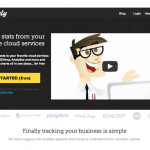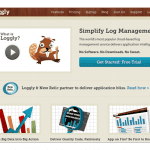For 20 years now, IBM is the main technology partner for the Australian Open. In just two decades, the Australian Open went from a watch-only tennis tournament to a full-interactive, data-rich tennis tournament that caters for the needs of millions of fans from around the world who want to know all about their favourite tennis player. During this years Australian Open, IBM has … [Read more...] about The Australian Open Gives Fans Deeper Insights With Data
Big Data
Learn everything you need to know about big data. Find out how companies are using this revolutionary technology and what it means for your business strategy.
Big Data Startup Informly Is An Analytics Platform For SME’s
Company Informly Address 3 / 21 Nind Street Southport Gold Coast, QLD 4215 Australia Founders Dan Norris Founded June 2012 Funding $ 0 Employees 3 Website www.Inform.ly Rating 4 bits Informly is an all-included analytics platform for Small and Medium sized companies who know that it is important to monitor all kinds of statistics, but who do not want to … [Read more...] about Big Data Startup Informly Is An Analytics Platform For SME’s
Crowd Control Management in the Twente Region
The combined use of data can help companies achieve more information and make better business decisions, but big data will have also a major impact on they way public services like the police, health organizations or the fire brigade operate. In The Netherlands, a remarkable, and for The Netherlands unique, initiative took place in December 2012. During the week before … [Read more...] about Crowd Control Management in the Twente Region
Loggly Offers a Cloud-Based Log File Management System
Company Loggly Address 251 Kearny St 8th Floor San Francisco, CA, 94105 USA Founders Jon Gifford & Kord Campbell Founded September 2009 Funding $ 10.4 million Employees 15 Website www.Loggly.com Rating 5 bits Loggly is a cloud-based log management system that allows user to monitor, debug and troubleshoot their business processes, IT infrastructure and … [Read more...] about Loggly Offers a Cloud-Based Log File Management System
8 Different Big Data Use Cases For Your Organisation
This Big Data platform is all about bringing together organizations who want to create a Big Data strategy and match them with Big Data startups. For organizations it is therefore necessary to understand how to use Big Data within an organization. Therefore, we have created a top 8 of the best Big Data use cases for organizations. Please let us know if you have more or … [Read more...] about 8 Different Big Data Use Cases For Your Organisation
What is big data?
Big data is a term that refers to the massive amount of digital data created and shared every day. Big data can transform how we live, work, and communicate. It can be used to improve everything from public health and urban planning to business and marketing.
Big data is also changing the way we think about privacy and security. The volume, velocity, and variety of big data present challenges and opportunities for organizations and individuals. Regardless, big data is here to stay, and its impact will only continue to grow in the years to come.
What is big data analytics?
Big data analytics is the process of turning large, complex data sets into actionable insights. Businesses use various analytical tools and techniques, including machine learning and statistical analysis, to do this.
Big data analytics can be used to improve decision-making in areas like marketing, operations, and customer service. It can also be used to identify new business opportunities and optimize existing processes. With the help of big data analysis, businesses can gain a competitive edge by using their data better.
Want to learn more about big data? Datafloq has courses available. Contact us to get started.
When was big data introduced?
The term big data was coined in the 1990s, with some giving credit to John Mashey for popularizing the term. However, the concept of big data has been around for much longer.
Where does big data come from?
In the early days of computing, scientists and businesses began to realize that the amount of data being generated was increasing exponentially. As a result, they began to develop new methods for storing and processing data.
Over time, these methods have become increasingly sophisticated and have played a key role in enabling businesses to make sense of vast amounts of information. Today, big data is used in various industries, from retail to healthcare, and its importance is only likely to grow in the years to come.
What are examples of big data?
One of the most common examples of big data is social media data. With over 2 billion active users, Facebook generates a huge amount of data every day. This includes information on user interactions, posts, and even location data. Analyzing this data can help companies better understand their customers and target their marketing efforts.
Another example of big data is GPS signals. These signals are constantly being generated by devices like cell phones and fitness trackers. When combined with other data sets, GPS signals can be used to provide insights into everything from traffic patterns to human behavior. Finally, weather patterns are another type of big data set. By tracking these patterns over time, scientists can better understand the impact of climate change and develop strategies for mitigating its effects.
How do companies use big data?
Companies use big data in marketing, product development, and customer service. By analyzing large data sets, businesses can identify patterns and trends that would be otherwise difficult to spot. For example, a company might use big data to track customer behavior patterns to improve its marketing efforts.
Alternatively, a company might use big data to improve its products by identifying areas where customers are most likely to experience problems. For instance, big data can be used to improve customer service by finding pain points in the customer journey. Ultimately, big data provides companies with a valuable tool for gaining insights into their business operations.







